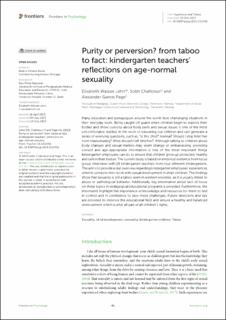| dc.contributor.author | Lehn, Elisabeth Walsøe | |
| dc.contributor.author | Chahboun, Sobh | |
| dc.contributor.author | Page, Alexander Gamst | |
| dc.coverage.spatial | Norway, Trondheim. | en_US |
| dc.date.accessioned | 2023-08-10T06:42:06Z | |
| dc.date.available | 2023-08-10T06:42:06Z | |
| dc.date.created | 2023-07-21T15:14:03Z | |
| dc.date.issued | 2023-07 | |
| dc.identifier.citation | Frontiers in Psychology. 2023, 1-9. | en_US |
| dc.identifier.issn | 1664-1078 | |
| dc.identifier.uri | https://hdl.handle.net/11250/3083259 | |
| dc.description.abstract | Many educators and pedagogues around the world face challenging situations in their everyday work. Being caught off guard when children begin to explore their bodies and show curiosity about body parts and sexual issues is one of the most uncomfortable realities in the work of educating our children and can generate a series of worrying questions, such as, “Is this child* normal? Should I stop him/ her from masturbating? What should I tell him/her?. Although talking to children about body changes and sexual matters may seem strange or embarrassing, providing correct and age-appropriate information is one of the most important things kindergarten employees can do to ensure that children grow up protected, healthy and safe in their bodies. The current study is based on empirical evidence from focus group interviews with 18 kindergarten teachers from four different kindergartens. The aim is to provide a real overview regarding kindergarten employees’ experiences when it comes to their work with sexual development in small children. The findings show that sexuality is still a taboo even in western societies, as it is usually linked to abuse or pathological behavior. Additionally, key information about lack of focus on these topics in pedagogical educational programs is provided. Furthermore, the informants highlight the importance of knowledge and resources for them to feel in control and in confidence to face these challenges. Future directions and tips are provided to improve the educational field and ensure a healthy and balanced development which is after all part of all children’s rights. | en_US |
| dc.description.abstract | Purity or perversion? from taboo to fact: kindergarten teachers’ reflections on age-normal sexuality | en_US |
| dc.language.iso | eng | en_US |
| dc.publisher | Frontiers Media | en_US |
| dc.rights | Navngivelse 4.0 Internasjonal | * |
| dc.rights.uri | http://creativecommons.org/licenses/by/4.0/deed.no | * |
| dc.subject | Sexuality; | en_US |
| dc.subject | child development; | en_US |
| dc.subject | normality; | en_US |
| dc.subject | kindergarten children; | en_US |
| dc.subject | Taboo | en_US |
| dc.title | Purity or perversion? from taboo to fact: kindergarten teachers’ reflections on age-normal sexuality | en_US |
| dc.title.alternative | Purity or perversion? from taboo to fact: kindergarten teachers’ reflections on age-normal sexuality | en_US |
| dc.type | Peer reviewed | en_US |
| dc.type | Journal article | en_US |
| dc.description.version | publishedVersion | en_US |
| dc.rights.holder | ©2023 Authors | en_US |
| dc.subject.nsi | VDP::Pedagogiske fag: 280 | en_US |
| dc.subject.nsi | VDP::Education: 280 | en_US |
| dc.source.pagenumber | 1-9 | en_US |
| dc.source.journal | Frontiers in Psychology | en_US |
| dc.identifier.doi | 10.3389/fpsyg.2023.1212456 | |
| dc.identifier.cristin | 2163049 | |
| cristin.ispublished | true | |
| cristin.fulltext | original | |
| cristin.qualitycode | 1 | |

